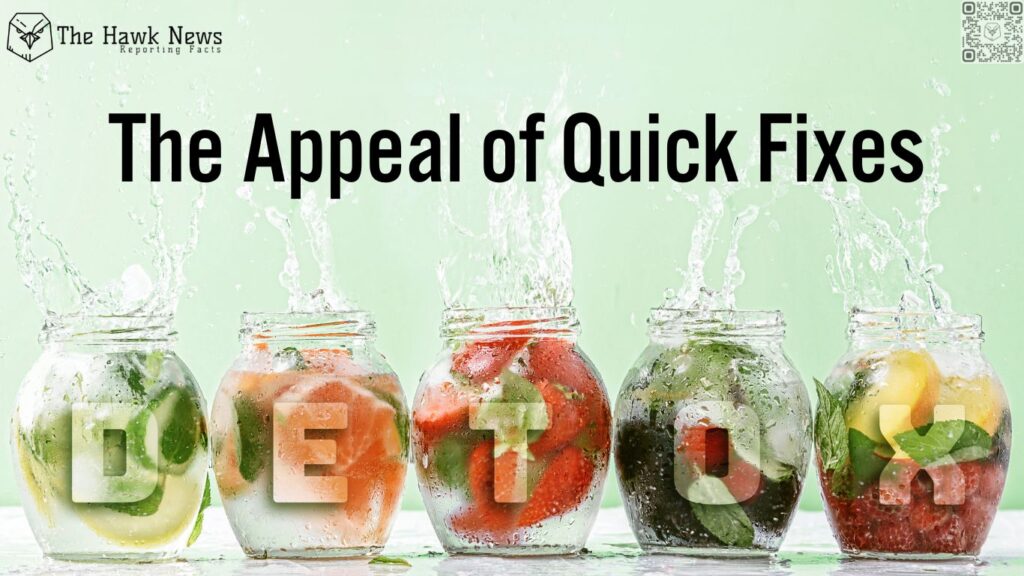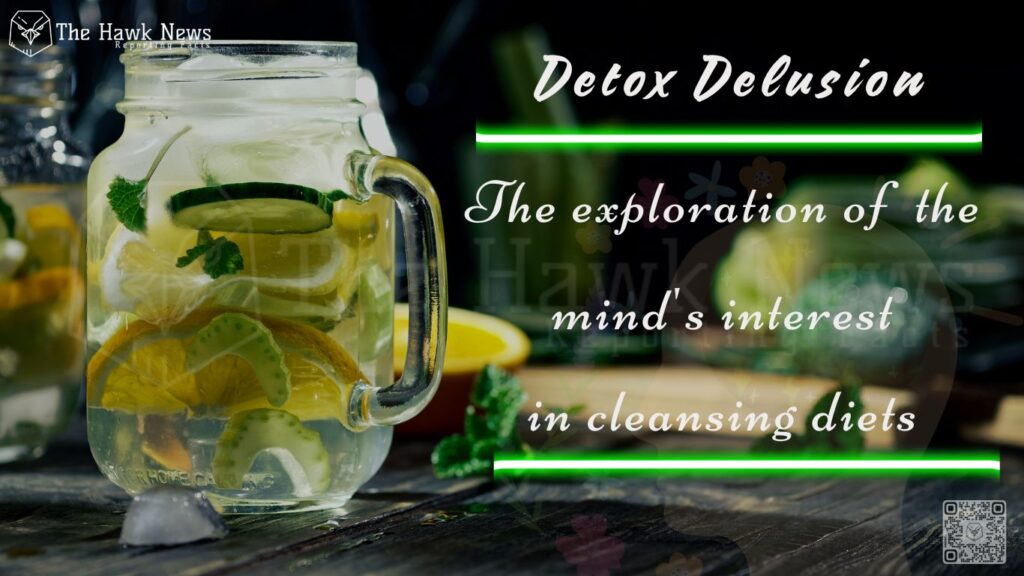
In an era where health and wellness are increasingly prioritized, detox diets have gained significant popularity. These diets, often promising quick weight loss, increased energy, and a general sense of well-being, appeal to millions of people worldwide.
Despite the lack of scientific evidence supporting their efficacy, detox diets continue to thrive in the wellness industry. This raises a critical question: Why do we believe in them?
This article explores the psychological factors that contribute to the allure of detox diets, delving into the human desire for control, the appeal of quick fixes, the influence of marketing, and the role of social validation.
The Desire for Control: Taking Charge of Health
One of the primary psychological drivers behind the popularity of detox diets is the desire for control. In a world that often feels chaotic and unpredictable, the idea of taking charge of one’s health through a detox regimen can be incredibly appealing. Detox diets offer a sense of empowerment, giving individuals a structured plan to follow, with clear rules and restrictions. This structure can create a feeling of control over one’s body and health, which is particularly attractive in times of stress or uncertainty.
For many, embarking on a detox diet is a way to regain control after periods of overindulgence or poor dietary choices. The promise of “cleansing” the body of toxins offers a psychological reset, allowing individuals to start fresh with their health goals. This sense of control can be comforting, providing a tangible action to counterbalance feelings of guilt or anxiety about one’s health.
Moreover, detox diets often come with strict guidelines that require discipline and self-restraint. Adhering to these guidelines can create a sense of accomplishment, further reinforcing the belief that one is actively improving their health. This perceived control over one’s well-being is a powerful motivator, driving individuals to commit to detox diets despite the lack of scientific evidence supporting their effectiveness.
The Appeal of Quick Fixes: Instant Gratification in a Fast-Paced World

Another key psychological factor that makes detox diets appealing is the human tendency to seek quick fixes. In today’s fast-paced society, where instant gratification is often prioritized, the idea of achieving rapid health benefits through a detox diet is highly enticing.
Detox diets typically promise quick results, such as rapid weight loss, improved digestion, and increased energy, which can be appealing to those who want to see immediate changes in their bodies.
The allure of quick results is deeply ingrained in human psychology. Research has shown that people are more likely to engage in behaviors that offer immediate rewards, even if those rewards are short-lived or come with potential drawbacks. Detox diets tap into this desire for instant gratification, offering a seemingly easy solution to complex health issues.
Additionally, the marketing of detox diets often emphasizes the short duration of these regimens, making them seem more manageable and less daunting than long-term lifestyle changes. The promise of achieving significant health improvements in just a few days or weeks can be particularly appealing to those who are overwhelmed by the idea of committing to long-term dietary or exercise plans. This focus on short-term results can lead individuals to overlook the lack of scientific support for detox diets, as they are more focused on the immediate benefits they hope to achieve.
The Influence of Marketing: How the Wellness Industry Shapes Beliefs
The wellness industry plays a significant role in perpetuating the appeal of detox diets through powerful marketing strategies. Detox diets are often marketed as essential for maintaining good health, with claims that they can eliminate toxins, boost metabolism, and promote overall well-being. These claims, often presented by influencers, celebrities, and wellness brands, are designed to appeal to consumers’ desires for health, beauty, and vitality.
Marketing campaigns for detox diets often use persuasive language and imagery that create a sense of urgency and necessity. Terms like “cleanse,” “reset,” and “detoxify” evoke the idea that the body is burdened with harmful substances that must be removed for optimal health. This language taps into common fears about environmental toxins, processed foods, and the impact of modern living on the body, leading consumers to believe that detox diets are a necessary intervention.
Furthermore, detox diets are often marketed as being “natural” and “holistic,” which appeals to those who are skeptical of conventional medicine and prefer alternative approaches to health. The association of detox diets with natural and organic ingredients reinforces the belief that these regimens are safe, gentle, and in harmony with the body’s natural processes, even though scientific evidence may not support these claims.
The endorsement of detox diets by celebrities and influencers also plays a crucial role in shaping public perception. When well-known figures promote detox diets on social media, it creates a sense of social validation and credibility. Consumers are more likely to trust and follow the advice of people they admire, even if the information is not scientifically accurate. This influence can be particularly strong among younger audiences who are more susceptible to the opinions of influencers and less likely to critically evaluate the evidence behind health claims.
Social Validation: The Power of Collective Belief
Social validation is another powerful psychological factor that contributes to the appeal of detox diets. When people see others around them—friends, family members, colleagues—participating in detox diets and reporting positive outcomes, it reinforces the belief that these regimens are effective. The collective belief in the benefits of detox diets creates a social norm, making it more likely that individuals will adopt similar behaviors to fit in with their social group.
The rise of social media has amplified the power of social validation, as people frequently share their detox experiences online. Photos, testimonials, and progress updates posted on platforms like Instagram and Facebook create a sense of community around detox diets, where individuals can connect with others who are on the same journey. This sense of belonging and shared purpose can be motivating, encouraging individuals to stick with their detox regimen even in the absence of scientific evidence.
Additionally, the public nature of social media can create pressure to conform to certain health and wellness trends. When detox diets are portrayed as popular and widely accepted, individuals may feel compelled to participate to avoid feeling left out or judged by others. The desire to be part of a trend, combined with the fear of missing out (FOMO), can drive individuals to adopt detox diets despite any doubts they may have about their effectiveness.
The Placebo Effect: Belief as a Powerful Force
The placebo effect is a well-documented phenomenon in which a person experiences real improvements in their condition simply because they believe they are receiving an effective treatment. In the case of detox diets, the belief that one is taking steps to cleanse and improve their body can lead to perceived health benefits, even if the diet itself has no scientific basis.
When individuals embark on a detox diet, they may expect to feel better, and this expectation can influence their perception of their health. For example, someone who believes that a detox diet will increase their energy levels may start to notice subtle changes in how they feel, attributing these changes to the diet rather than other factors such as placebo, changes in routine, or increased mindfulness about their health.
The placebo effect can be particularly strong when combined with the psychological factors discussed earlier—control, quick fixes, marketing influence, and social validation. When individuals are fully invested in the belief that a detox diet will work, their brain can produce real physiological changes, such as reduced stress levels or improved mood, which they may then attribute to the diet.
Conclusion: Understanding the Psychological Appeal
The popularity of detox diets, despite the lack of scientific evidence supporting their effectiveness, can be largely attributed to the powerful psychological factors that drive human behavior. The desire for control, the appeal of quick fixes, the influence of marketing, social validation, and the placebo effect all contribute to the widespread belief in detox diets.
Understanding these psychological drivers can help individuals make more informed decisions about their health and well-being. By recognizing the factors that make detox diets appealing, consumers can critically evaluate the claims made by the wellness industry and choose health practices that are based on sound scientific evidence rather than psychological persuasion. In doing so, they can focus on long-term, sustainable health strategies that truly support their well-being.